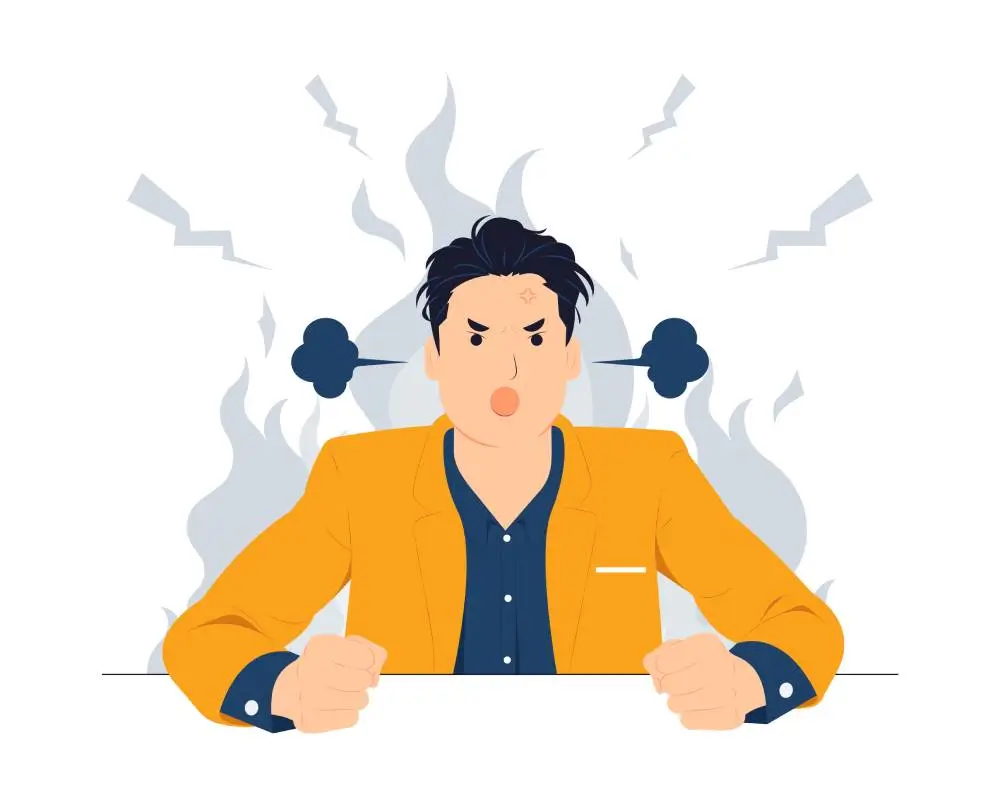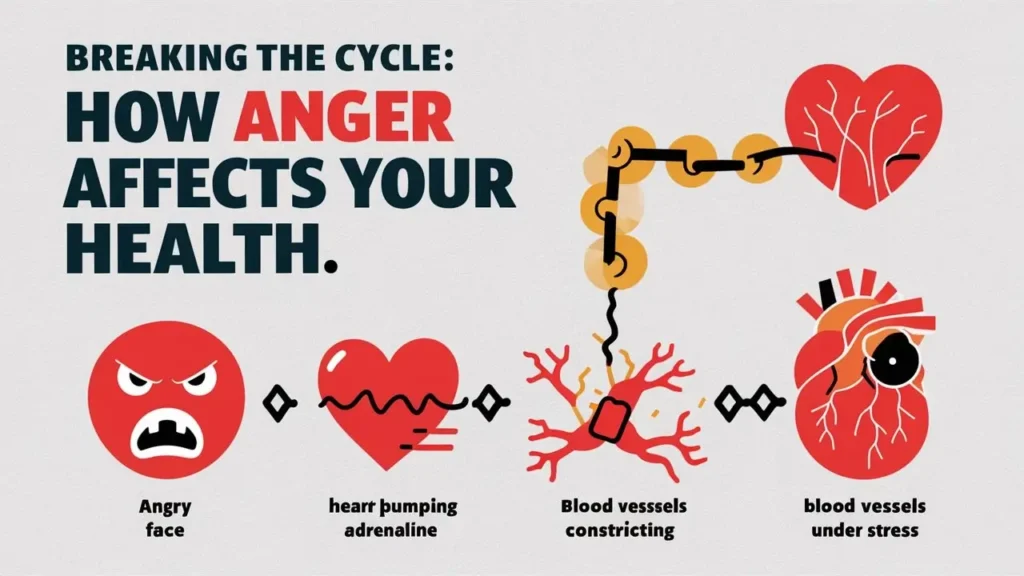
Did you know?
Your feelings affect your body. This isn’t a new idea to many people. A happy feeling feels good. A sad feeling is draining. Do you know that anger is an even faster effect? Anger is harmful even if it happens just for a second. It disrupts your body’s defense system. The body’s defense system is the immune system. The immune system fights off illness.
The Quiet Attacker: Anger’s Lightning Strike
Picture that you are angry. Someone cuts you off while you are driving. Your manager says something rude. Your face flushes. Also, your heart quickens. Your body is ready. Think of the response as your body is readying for the “fight or flight” response, to react to a threat. You get angry and your brain sends heavy, strong signals, and you release stress hormones, adrenaline, and cortisol.
The sudden stress response is there for a reason. It helps to defend against a threat. But in the meantime, it is also using your energy away from other situations. Your body is focused on surviving the immediate accident, and it takes energy away from all other functions, including the immune system. Studies have indicated that even if you get into an argument for five minutes, it can affect your immune function for about a full day. So, that shift is normal; however, if the angry feeling happens often, it escalates.
Read more: Shedding Roles: Uncover Your Core Identity

The Defenders of Your Body: How They Suffer
Your immune system is a complex army, and it has many different kinds of cells. Your immune cells fight viruses, germs, and bacteria. When you get mad, your body releases stress hormones formulated from your experience. One of those stress hormones is cortisol, which tells the immune cells to slow down and depresses their action.
Here’s how having anger affects your body’s level of protection:
- Fewer Killer Cells: Your body makes fewer “natural killer” cells. These are important in that they find and destroy infected cells.
- Slower Immune Response: Your immune cells now have a slower response and lower effectiveness, and can have difficulty finding invaders.
- More Inflammation: Stress can cause increased inflammation. Inflammation is your body’s alarm signal. Your immune system always has inflammation, and it will fluctuate based on any perceived dangers. When the danger is prolonged, inflammation may eventually become excessive in some cases, damaging tissues and organs and ultimately compromising your overall health.
- Less Robust Antibodies: Your body makes antibodies, small shields that protect against specific germs. Hence, anger can diminish their efficacy.
Consequently, you are at an elevated risk of infection. You can easily catch a cold; if you do become sick, it will take you longer to heal. Small infections will likely become a problem as well.
Mind Over Matter: A Psychological Perspective
Anger is a common emotion. Everybody feels it at some point or another. Anger can be useful. It draws our attention to messages of unfairness. It motivates us to act. However, expressing anger is different from holding on to anger. When we replay angry thoughts, it is called rumination, which simply means we are keeping our stress response alive. Hence, we are keeping our bodies in fight mode, and staying in a constant state of fight mode drains energy and uses up valuable resources.
Moreover, a chronic state of anger can change one’s perception of the world. There may be little distress that sets off a personal alarm (i.e., a perceived threat), and even if we don’t see more threats in the world around us, we may be more skeptical of trusting others. This, in turn, influences our relationships, subsequently adding to our stress. This vicious cycle depletes and undermines our mental defenses and cognitions of self and others; it also weakens our physical defenses. hence, simply learning how to cope with this emotion of fear is imperative in supporting the mind and body.
Stop the Cycle: A Road to Health
By managing your anger, you significantly help yourself. You feel better emotionally. You also help yourself physiologically. When you manage your anger, you reduce your stress hormones. This allows your immune system to heal. Your body can reallocate energy for healing. This strengthens you. It creates resilience. You feel more at peace. You are less likely to get sick.
This is not just about you physically. The change is holistic. You relate to people differently. You find it easier to problem solve by staying calm. Also, you experience more happiness overall. This reinforces a positive cycle: a calm mind creates a healthy body.

Practical Steps: Quieting the Fire
You can learn to handle anger. Here are a few simple steps to help your immune system:
- Pause and Breathe: When anger erupts, stop. Take three breaths. Spending time inhaling and exhaling calms your body.
- Identify the Trigger: Ask yourself, “What happened that made me feel angry?” You must understand and acknowledge what has triggered your anger.
- Express Calmly: When stating what you need, say, “I feel …” talk and make your needs known without yelling. This gives you both time to clear the air.
- Move Your Body: Go for a walk. Stretch. As long as you are doing some sort of physical activity, involuntarily releasing any stifled tension stored in your body is useful.
- Change Your Thinking: Challenge the angry thoughts. Are they fair? What is a different way to look at the situation?
- Get Help: Talking about your anger with a trusted friend or therapist is useful, especially when you feel your anger is “controlling” you.
- Get Enough Sleep: Being rested is so important. When you are tired, you feel more irritable and you weaken your acknowledgement of emotions. Sleep helps the immune system.
Read more: How to Set Boundaries and Still Feel Good
Recent Case Study:
A psychoneuroimmunology article published by Bridge Chronicle in July 2025 highlighted how just five minutes of intense anger can suppress the immune system for up to 6 hours.
Anger can make you feel jazzed, and that is due to stress hormones like cortisol and adrenaline being released in the body. Stress hormones trigger the fight or flight response. Unfortunately, this response also suppresses one’s immune functions like natural killer (NK) cells and salivary immunoglobulin A (sIgA), which protect the body against infections (when considering the latter, have you noticed your dry mouth during heightened states of anger?).
In fact, as little as a single moment of anger could cause a reduction of the derisive effect on NK cells’ activity of up to 40% and increase inflammatory levels like IL-6 (interleukin-6) and C-reactive protein (CRP).
That being said, this destruction can be undone. Deep breathing and mindful practices coupled with changing your train of thought to gratitude, empathy, or compassion can calm the body’s nervous system and reverse the immune system’s functions. Since all distractions could be considerable as daily irritations that you need to manage, they greatly affect your body if not managed appropriately. Therefore, staying calm not only bubbles up good thoughts in your mind but also helps protect your body. Never again underestimate the debilitating effects of a single moment of anger affecting your health in significant ways.

The Purdue connection: Mind, Body, Immunity
Your mind and body connection is very strong. Your emotions are also intense. They directly affect your physical health. Even mild periods of anger can disrupt body processes (including your immune system) and short out brain pathways related to problem solving. Long-term anger can cause physiological changes to occur that can damage the body and cause it to malfunction.
For these reasons, it is important to control anger. It is not only to feel better, it is to maintain or increase your health, or maintain or improve your body defenses. Start small with anger control. Try to manage anger, and learn to cope with it in healthy, appropriate ways. Spend some of your own resources on your emotional state. It might be one of the best investments you make for your body. Each of your will be much better off. You will feel better. You will be happier. Also, you will have health and health of mind.



Leave a Reply